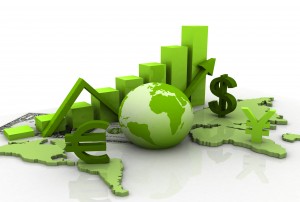4th July 2012
OECD and IMF ‘Triple Crisis’
 I only started blogging a week ago so I hope you’ll indulge me if I go back to something from June, as I think it is an issue that is only going to get more important.
I only started blogging a week ago so I hope you’ll indulge me if I go back to something from June, as I think it is an issue that is only going to get more important.
I’m talking about IMF Chief Christine Lagarde’s “Back to Rio, the road to a sustainable future” speech at the Center for Global Development (CGD), just up the road from the IMF in Washington DC.
Lagarde said (my itallics) “We are facing a triple crisis – an economic crisis, an environmental crisis and increasingly a social crisis…these different threats feed off each other in an intricate interplay. We cannot address each in isolation”. Lagarde talked about achieving sustainable and inclusive growth. She pledged support for green GDP, carbon pricing, natural resource accounting and phasing out of fossil fuel subsidies (which cost $500billion a year, and was one of the most talked about issues at Rio).
CGD bloggers noted that the remarks, “would not have been newsworthy coming from the head of an international environmental NGO or even the head of the World Bank, but from the head of the IMF, a citadel of economic orthodoxy, they surprised and delighted”.
My particular interest is that these remarks put the IMF, at least on a rhetorical level, in a very similar place to the OECD, which has always stressed the importance of environmental and social policies and whose headline message in recent years has been “Go Structural, Go Social and Go Green” but like the IMF has a reputation for economic orthodoxy.
As the OECD forges ahead on Green Growth it can only be good news if the IMF is engaged. The world’s two leading international economic organisations have gone on the same intellectual journey and appear to be arriving at the same place. Is this a new orthodoxy where environmental issues are properly mainstreamed into economic thinking?
Let’s hope IMF and OECD member governments are listening. Not least in view of a recent report by a sister organisation of the OECD – the International Energy Agency – who said that the radical transformation of our global energy system that is needed to limit global temperature rise to 2 degrees is way off-track and that the situation is “bleak” and “woeful”.
As Chairle Sheen says, this article is “WINNING!”
Dear Nick, congratulations to all of your reports released so far.For to me there ‘s is no reason for indulge yourself for you have been started to write “a week ago”.In my opinion it ‘s still the quality and not the quantity which is important.But I must admit that I ‘ve got some problems in re.of Mrs. Lagarde ‘s “Back to Rio”-speech.To me it ‘s all a little bit too overblown, she has repeated herself often by using sentences of other speeches of herself and-most notable-it ‘s not so easy to understand the real meaning behind her words-esp. for “the common people on the streets”.There ‘s too much influence of the IMF and Mrs. Lagarde ‘s sentences are often a cross between the real facts and just clever word phrases.But-maybe most important-one result is clear: A discussion between GDP, CGD Bloggers , the OECD or the IMF has started.This should be a 1st. good sign for all those things of which we are surely facing within the next months.
BW + bon chance, Ingo-Steven Wais, Stuttgart